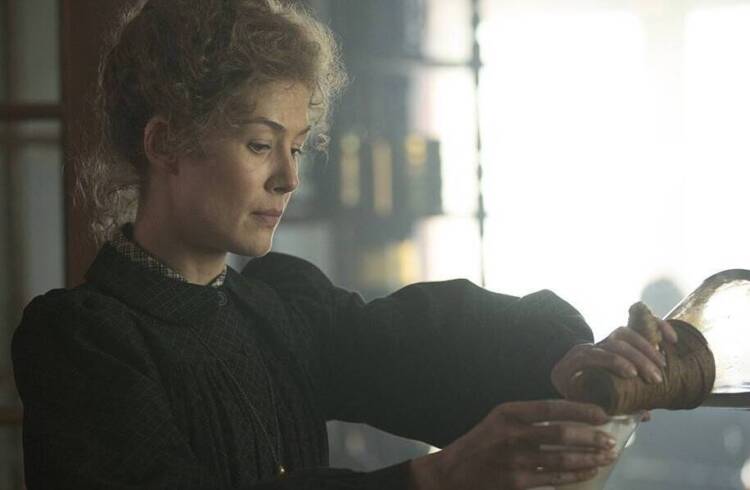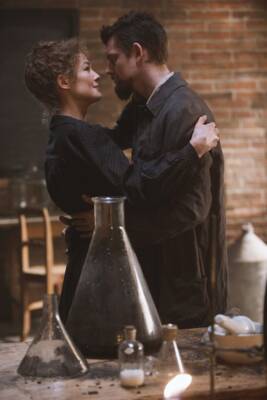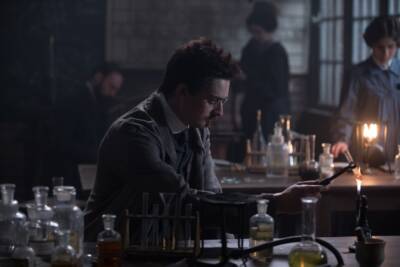
“Radioactive” — a film review by Gary Chew.
The title is quite specific, even if it might fool you about what the film is about. It is a period movie taking place mostly in Paris late in the 19th century and early on in the 20th. Radioactive is the perfect movie for younger people not having given much thought about the history of the prolific scientist and intellectual, Marie Curie.
 Curie was the first woman to receive a number of significant honors; and to obtain coveted university teaching positions. To list them would detract from discussing Radioactive, the product of an Iranian-French filmmaker named Marjane Satrapi.
Curie was the first woman to receive a number of significant honors; and to obtain coveted university teaching positions. To list them would detract from discussing Radioactive, the product of an Iranian-French filmmaker named Marjane Satrapi.
Born in Warsaw, Curie migrated to Paris. There she met a well-educated man of science named Pierre Curie. Madame Curie was born Maria Skiodowska. The couple had two daughters.
Rosamund Pike, who was nominated for a Best Actress Oscar in Gone Girl, puts tremendous energy into the character of a woman who quite obviously had plenty of her own energy living a life that has made a powerful impact on today’s medical science and technology.
Radioactive is a routine example of the biographical motion picture. You might say: “It’s a movie you’ve seen before,” but with other great lives calling the shots for what happens. Al Jolson, Glenn Miller, Babe Ruth, Buddy Holly, George Patton and other important figures who came before us have their stories all locked in a similar template.
 Madame Curie and her husband won the Nobel Prize just after the turning of the 19th century. It was almost simultaneous with when Claude Debussy became internationally well-known as a great French composer. Just seeing Sam Riley in the role of Monsieur Curie made me think of Debussy. Riley, at first glance, seems to look and dress as Debussy did in the early 1900s. French impressionistic music is used sparingly on the soundtrack. But the fashions, architecture and décor all say, “Yes, this must not only be France, but indeed … Paris.”
Madame Curie and her husband won the Nobel Prize just after the turning of the 19th century. It was almost simultaneous with when Claude Debussy became internationally well-known as a great French composer. Just seeing Sam Riley in the role of Monsieur Curie made me think of Debussy. Riley, at first glance, seems to look and dress as Debussy did in the early 1900s. French impressionistic music is used sparingly on the soundtrack. But the fashions, architecture and décor all say, “Yes, this must not only be France, but indeed … Paris.”
Pierre’s life was cut short in a horse and carriage street accident. After a time, Marie became involved with a slightly younger Frenchman who was an understudy to her late husband. Even though it was France, but barely into the 20th century, Curie was publicly berated for her affair with Aneurin Barnard, played by Paul Langevin. This social reaction hindered her as much as merely being female had previously held her back when making professional advancements in teaching, physics, chemistry and scientific research. What a woman.
Madame Curie died of aplastic anemia due to routine radiation exposure on the 4th of July, 1934. She was 66.

- Movie Review: ‘The Glorias’ - September 28, 2020
- Movie Review: ‘I’m Thinking of Ending Things’ - September 10, 2020
- Movie Review: ‘The Burnt Orange Heresy’ - August 31, 2020

